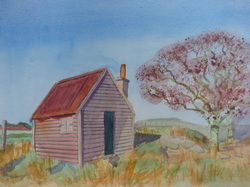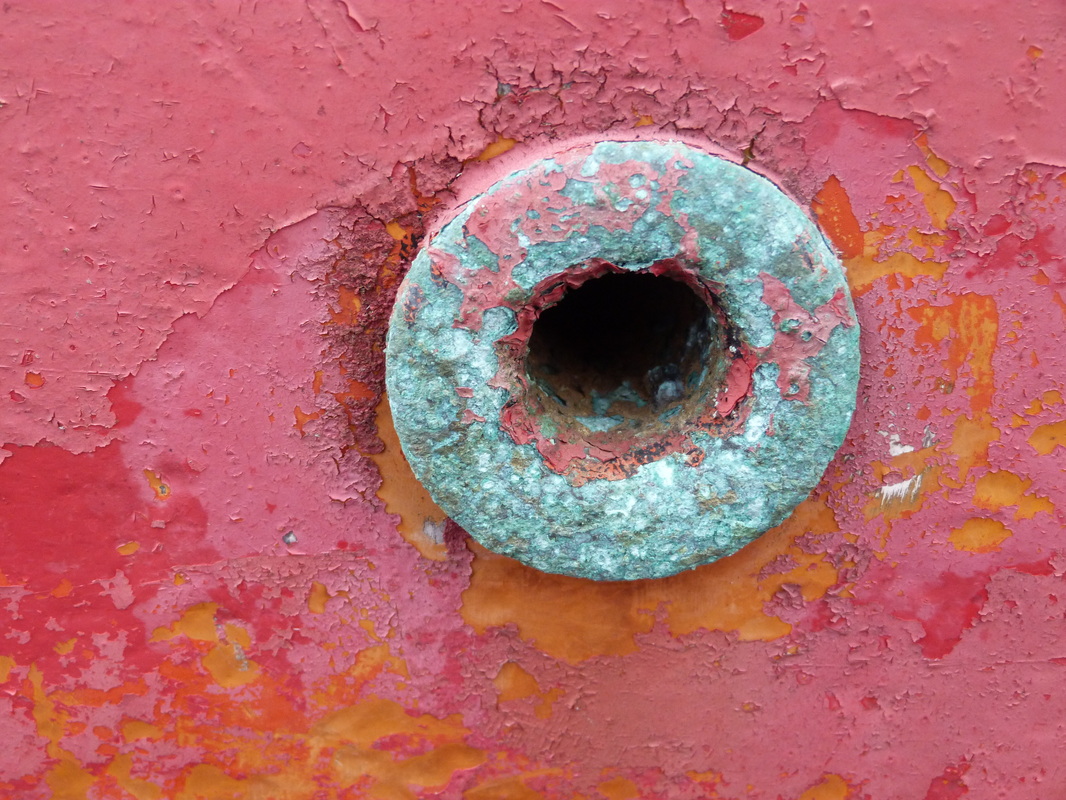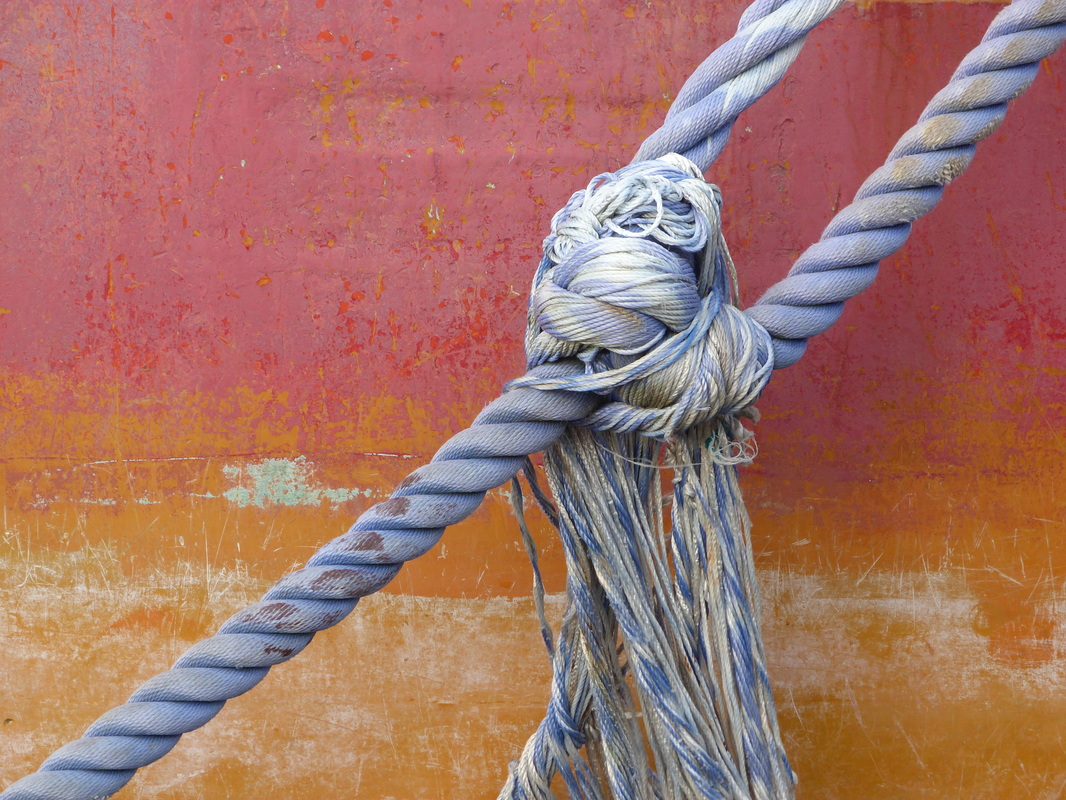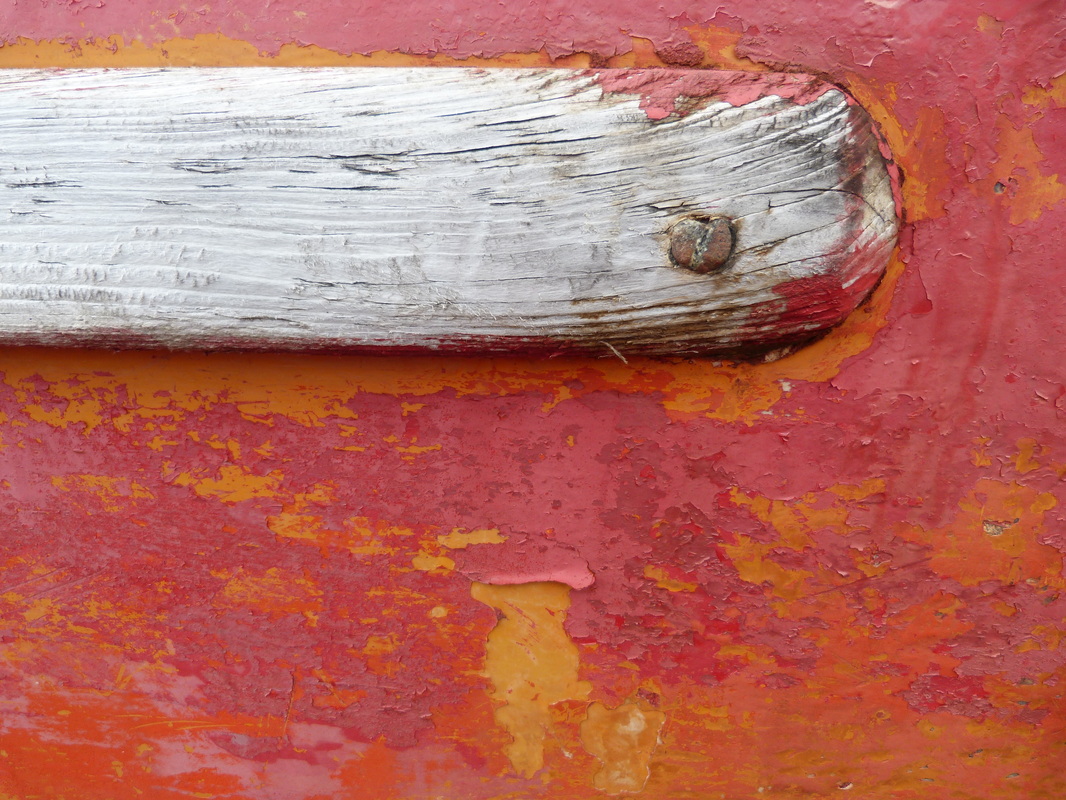 I have been asked a few times recently, what I paint. I have happily told the questioners that boats feature a lot in my paintings at the moment; ones from both the east and west coasts of Scotland. And then I mention the sheds, and they look slightly bemused and I feel rather apologetic. I'm not sure why this is, so I have spent some time thinking about it, as I suppose there really should be some underlying reason as to why I feel drawn to sheds, particularly ones with corrugated iron roofs. This is the conclusion I have drawn. It all goes back to summer holidays spent in Lochcarron, in Wester Ross, in what had been my paternal granny's house. Not just summer holidays, when we would spend hours on the shore turning over rocks looking for butterfish and crabs, or digging very fast to try and outwit clams which scooted down into the sand, or for lugworms, beneath their telltale casts, to use as bait on fishing expeditions. No, we were often there at Easter too, and in the winter as well. There are diaries of those holidays somewhere. One day I'll look them out. At the back of my granny's house were a couple of wooden sheds, where the garden tools and coal (I think) were kept. They were quite well-maintained, these sheds; wooden slats with sloping corrugated iron roofs. They were of no particular interest to me. It was my job in the summertime to clip the long grass away from the outer walls of the shed, so the wood would not become damp and rot. This job was done with an old pair of sheep-shearing shears. I loved using them. I learned to scythe in those summers too, when the grass was thigh-high when we arrived, and had to be cut down before it got trampled flat. There is a rhythm required for scything - enough speed is required to cut the tough grass stalks, but go too fast and you get tired very quickly and the grass is not properly cut. But the shed I liked best was the one away up at the back of the plot or land (part of a croft at some time, I suppose). It had no door, but the doorway faced away from the prevailing wind, so it was always sheltered and warm. I think it even had a little window, grimy and cobwebbed. I set up a wooden table and a stool, made from logs and planks of wood that I found. It was my den. I swept it, tidied it, put a jam jar filled with wild flowers on the table. And then I had a visitor. I think he lived in the shed next door, or under a nearby pile of branches. A hedgehog. I provided a saucer of milk, sat in the corner, barely breathing, watching, listening, drinking him in. I was in love. In my shed.
3 Comments
Last weekend I discovered that it's not easy to take photographs with gloves on. The air was chilly, as one would expect at the start of February in the Scottish Highlands. The pale turquoise soft wool gloves I received as a Christmas present nearly worked, though I struggled to take the lens cap on and off. Still, some photographs were taken; more "source material", as I have come to call it, for my boat paintings. And also some photos which I think work well just as they are - like the ones above. They are bits of a boat which has been lying on top of the harbour in Gairloch in Wester Ross for quite a while now. It's a great subject - I've taken pictures of it before. I love the peeling paint, where layers have come off to show what lies underneath; the corroded metal, like verdigris - perhaps it is.
Before Christmas, at a little fair where I was showing some of my recent work, an American lady asked me why I was painting boats. I hadn't really thought about this; I like them, the shape of the them, the colours. But it is more than that. I only started to discover the answer when I told them that I used to sail. And now I have thought about it some more and these memories have come to me. I used to sail a lot when I was young. I sailed at school, in the sailing club; in a dinghy, on Linlithgow Loch, on summer evenings. And then we sailed as a family, a wee blue wooden dinghy to start with, then a slightly bigger boat, a cruiser with an inboard engine and bunk beds, a gas stove for making toast and tea and heating soup. We sailed on the Firth of Forth during term time and then on the west coast of Scotland during the summer holidays The boats were towed north and then south. Long days were spent trekking the trailer down the shore, waiting for the tide to come in, floating the boat off and then mooring her safely in the bay. I was never so keen on sailing in the cruiser. There wasn't the immediacy, the closeness to the water, that one felt in a dinghy. The sound of the water lapping at the bow, the feel of the rudder in my hand, the tautness of the sheets, held against the wind. Watching the luff of the sail for any flapping, indicating that you were sailing too close to the wind. Or the homemade woolen telltales tied to the stays, showing exactly where the wind was coming from. All these memories, there in the back of my head; there whenever I paint another boat. There is more about this in there - more for another day. I have been listening to Woman's Hour on Radio 4 again this morning, as I do most mornings. The discussion was about choosing to have children versus choosing to remain childless. I was reminded of a piece which I wrote a while ago. Coincidentally, my thoughts have been on babies and children for the past few days, as our younger child turned twenty yesterday. Finally, the teenage years are over. A new chapter is beginning. Here is the piece.
I Wish them Luck the young married couple next door have decided to have a baby good for them I wish them luck No really, I do But I also wish someone would tell them, and I know that no-one will and even if they did, the poor souls would not listen to a word of it, that they are not just having a baby – they will be having a tiny infant who cries in the night and demands their attention - their attention no-one else is going to attend to its needs they will have to and they alone or together if they choose a teething, gurning one year old who cries in the night and demands to be soothed not just once, but many times a defiant toddler who says No before he learns to say Yes, or please, who lies on his back on the floor and kicks his feet and screams very loudly when he does not get his own way, and produces large amounts of tears, snot and poo, generally into nappies and eventually, after you have worked out some sort of system or read a very clever book, but probably mostly just listened to your own mum, into the toilet. a small child who socialises with other small children and learns things from them, not just from you. Words like bum and fart and other useful terms for bodily functions a small child who has to go to school but may not understand why this is so who may go there the first day, come home and say – so, I’ve been there, where do I go tomorrow? a small child who asks interminable questions, usually in the car at roundabouts or hazardous crossings or while you are trying to remember who you are, where you work and what you should have with you in order to do that work. A functioning brain is often helpful, but scarily difficult to retain. a slightly larger child who likes to have friends round to play which necessitates conversing with other parents, which often leads to comparisons which are nearly always, no in fact are always distinctly unhelpful. Especially if their smart little Alec can read before he enters primary 1 So, the slightly larger child sounds a bit easier – yes and no – they still go to bed largely when you say so you know where they are all the time , as you have a calendar strapped to your person at all times so that you don’t forget to collect them from swimming/judo/karate/piano/French lessons, but they have by now decided what they do and don’t like to eat. So you eat what they eat. Do you like being an eight year old again? No, I didn’t think so. Best to feed then what you have, if you possibly can. Excellent. The even larger child is lurching towards being a teenager. A word that did not exist in recent times. well, when I was one, I wasn’t. It wasn’t. They weren’t. There weren’t any. Well, there were, but they didn’t know that they were. If you see what I mean. Maybe you still are one. And have just had a baby. How scary is that? So, the teenager emerges from the cocoon of puberty, only they don’t hide away much. And they’re quite noisy. Play loud music. Assert their rights. Without taking any responsibility. Treat parents like slaves. Only worse. But then that’s probably our fault. And then, eventually, this tiny infant, baby, small child, bigger child, big child, teenager, becomes a … human being so, not a baby, then? no, a lot, lot more than that. be careful what you wish for. I wonder how these two words make you feel. They have been known to strike dread in the heart, to cause sweaty palms and instant memory loss. To name but three. The many online places where we choose to log in these days do not help the situation. Personally, I have email, Twitter, Facebook, a photography website or three, access to my utilities bills, online banking (with more than one bank) and some other places where I only log in occasionally. I am sure there are more; I just can’t recall what they are right now. Mostly, I use the same username and password. Oh dear, now I’ll have to go and shoot myself. No, not really. But I have a limited range of passwords, to match my rapidly declining memory powers.
Quite often, my username is actually my email address. Or the first part - before the @ - of my email address. But there is never a clue as to which it will be. I generally type in what I think it is and hope for the best. Mostly, I get it right. But, ask me what my online banking number is, actually ask me to tell you it, without the box in front of me on the screen, into which I can type it, and I am stumped. (Not that I would actually tell you it of course, this is all theoretical thinking.) Completely stumped. Well, not quite completely. I know that there are two zeros in it somewhere, or maybe even two sets of two zeros, but my brain does not seem to be capable of producing the goods without the prompt of an empty box on a screen. I wonder if I should be worried about this. I wonder if anyone else worries about this. Is there a sort of Pavlovian response by the brain to the on-screen prompt? I suppose there must be. And since I log into many sites every day, it is actually more likely to be muscle memory (those of my fingers rather than my brain) which is coming into play. In the same way that my fingers “remember” where to place themselves on the frets for the tunes I play on the mandolin (sometimes). I don’t consciously think about each note, about what comes next. If I start doing that, I trip and stumble. And fall. It’s the same with remembering usernames and passwords, I think. Don’t think too hard about it. It’s a bit like looking directly at a star – you see it better if you look slightly off to the side. Or trying to solve a crossword clue – let your brain relax and go off at a tangent. Which seems to come quite easily to me, somehow. |
Archives
February 2024
Categories
All
|



 RSS Feed
RSS Feed